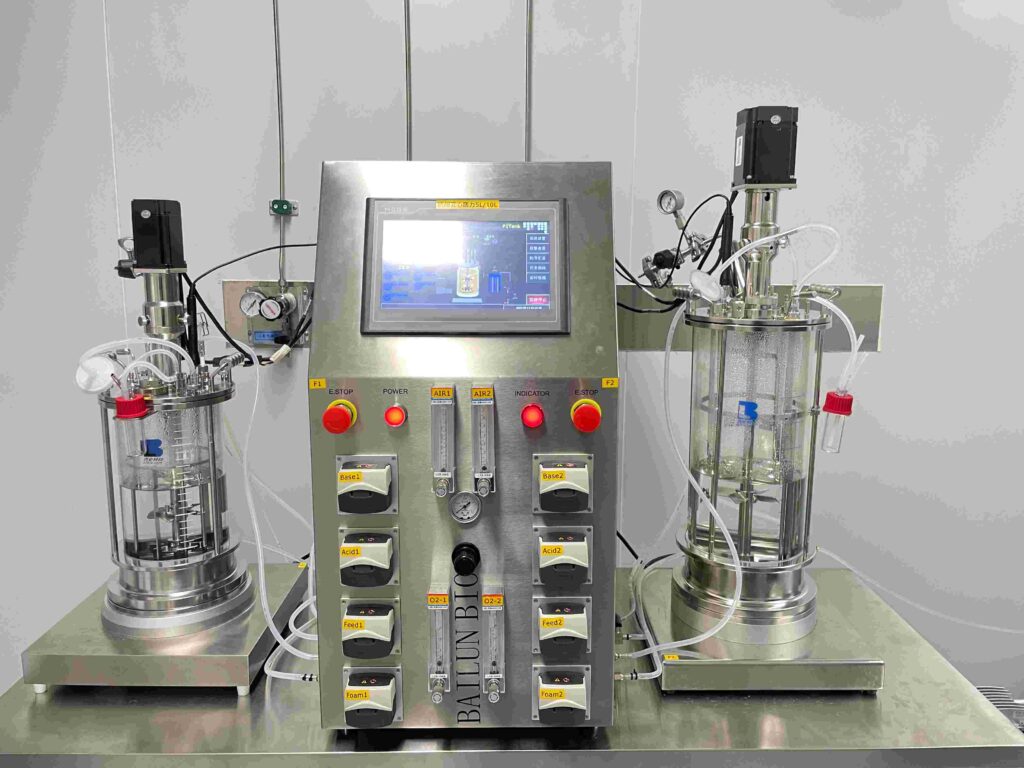
The functions of a lab fermenter are as follows:
1.Provide suitable environmental conditions: The lab fermenter can provide constant temperature, pH, oxygen content and other parameters to meet the requirements of different biological reactions. These parameters of benchtop bioreactor have a vital impact on cell growth, metabolite production and other biological processes.
2.Achieve control of biological processes: The lab fermenter can accurately control the progress of biological processes and the generation of products by adjusting parameters such as stirring speed, gas supply rate, and nutrient material concentration. This is of great significance for studying the dynamic changes of biological processes in the laboratory and optimizing product yield and quality.
3.Monitoring and sampling: The lab fermenter is usually equipped with sensors and monitoring equipment to monitor key parameters in biological reactions in real time, such as cell density, metabolite concentration, etc. In addition, the lab fermenter can also perform timed or quantitative sampling for further analysis and evaluation of the reaction.
4.Small-scale production and R&D: lab fermenters are often used in the initial R&D stage of biopharmaceutical production, and can be used for small-scale production and evaluation. The lab fermenters can be used to screen and optimize production strains, culture conditions and process parameters, and provide guidance for subsequent large-scale production.
The lab fermenter is a powerful experimental equipment designed to provide optimized environmental conditions for biological processes and control the reaction process. The lab fermenter is used in biological research, drug production, biofuel production, environmental remediation and other fields. The lab fermenter is one of the important tools for bioprocess and biotechnology research and has broad application prospects.
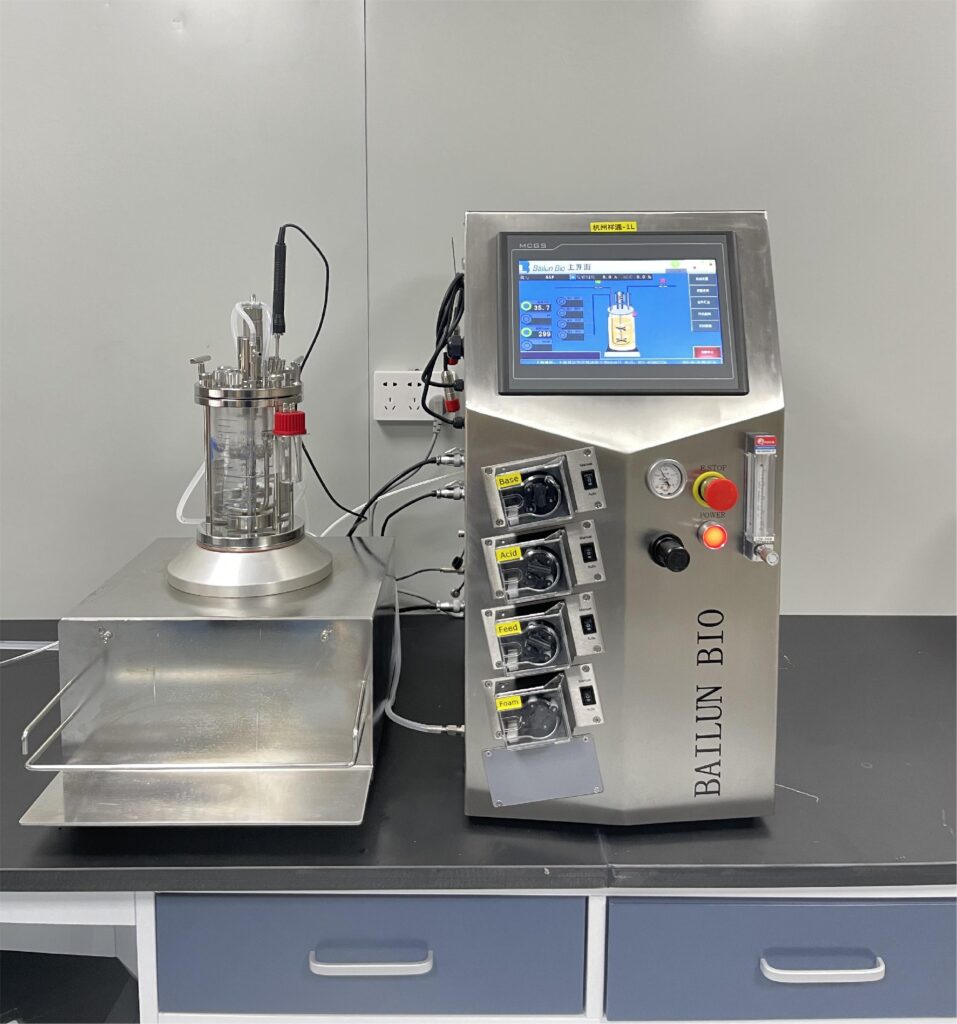
![]()
The main components of a lab fermenter usually include the following:
1.Reactor vessel: Also known as a fermenter or culture tank, it is the main part of the reactor. It is usually made of transparent glass or plastic materials to facilitate observation of the reaction process. Reactor vessels have different volumes and shapes, and the appropriate container size is selected according to different experimental needs.
2.Stirring system: A stirring system is installed in the lab fermenter,which produces shear and mixing effects in the reaction materials through a stirring paddle or agitator. This helps to maintain uniform temperature, gas distribution and uniform supply of nutrients, promote cell growth and production of metabolites.
3.Sensors and monitoring devices: lab fermenters are usually equipped with various sensors and monitoring devices for real-time monitoring of key parameters in the reaction process, such as temperature, pH, oxygen content, cell density, metabolite concentration, etc. These devices can provide real-time data of the reaction process, helping researchers understand the reaction dynamics and control the reaction.
4.Control system: The control system of a lab fermenter is usually controlled by a computer or similar instrument, which can adjust and control various parameters in the reactor, such as temperature, pH, stirring speed, gas supply rate, etc. This allows precise regulation of reaction conditions, making the reaction process stable and controllable.
5.Gas supply system: lab fermenter bioreactors usually require an appropriate amount of gas supply, including common air (oxygen), and some special gases such as carbon dioxide can also be used. The gas supply system can ensure that the appropriate amount of gas enters the reactor and maintains convection and uniform gas distribution through components such as gas filters, gas flow controllers and distributors.
6.Temperature control system: lab fermenters require stable temperature control to keep the biological reaction within the appropriate temperature range. The temperature control system usually consists of a temperature sensor and a heater, which can adjust and maintain the temperature inside the reactor according to the reaction requirements.
7.Data recording and control software: lab fermenters are usually connected to a computer or data recorder. Through special data recording and control software, various parameters in the reaction process can be recorded in real time, and data analysis and processing can be performed.
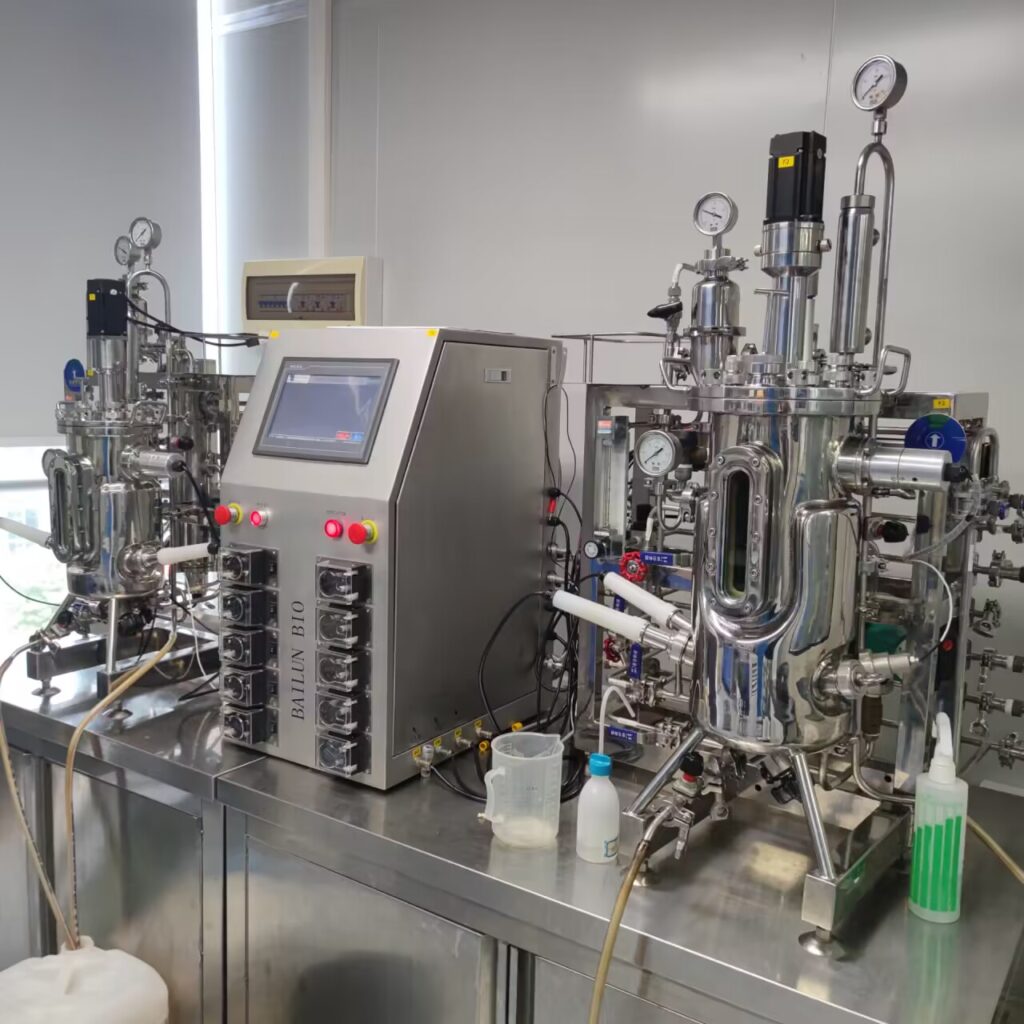
Benchtop bioreactors can be classified according to different classification standards. The main classifications include the following two categories:
- Classification based on stirring method:
Bubble stirring type lab fermenter: A gas inlet device is set at the bottom or side of the reactor. The gas enters the liquid to form bubbles, stir the liquid and provide oxygen supply. This stirring method is simple and low-cost, and is suitable for some biological reactions that require lower wave intensity.
Mechanical stirring type benchtop bioreactor: The reaction liquid is stirred by a motor-driven stirrer or stirring paddle to achieve uniform mixing of the liquid and oxygen transmission. This stirring method is more flexible and controllable, and is suitable for biological reactions that require higher wave intensity and precise control.
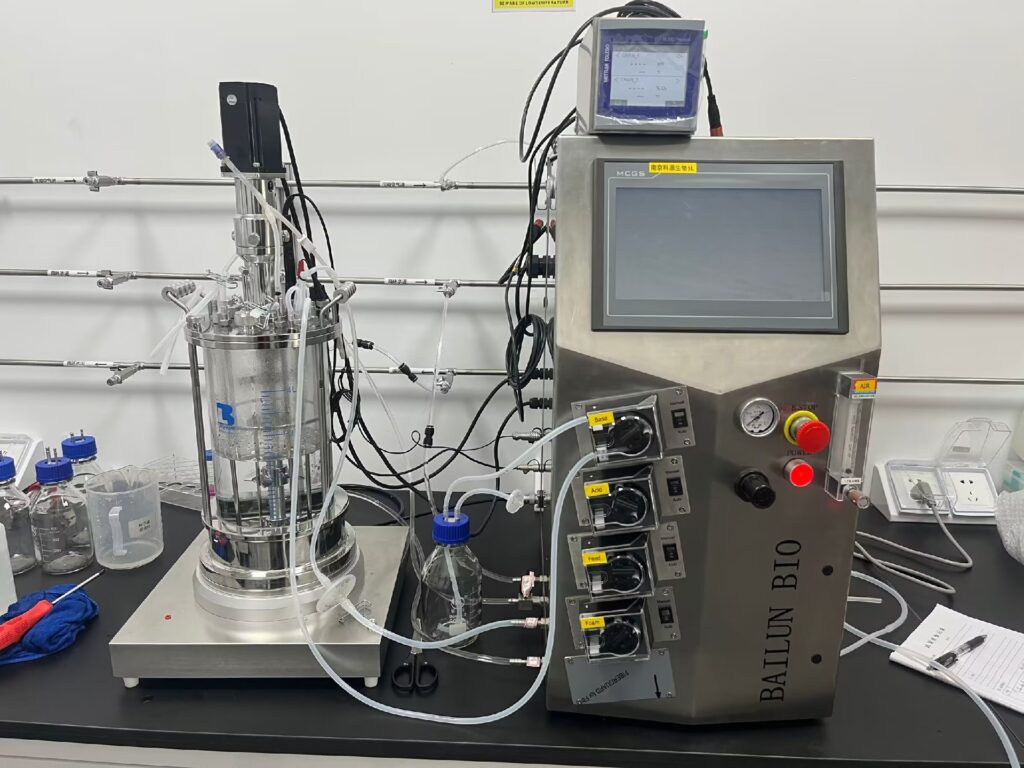
- Classification based on operation mode:
Discrete operation type benchtop bioreactor: Batch reaction operation is carried out in the reactor, that is, a certain amount of culture medium and organisms are added to the reactor, and culture and reaction are carried out for a period of time, and then samples are collected for analysis. This operation mode is often used for small-scale experimental research and preliminary screening.
- Continuous operation type benchtop bioreactor:The reaction operation is carried out by continuous feeding and collection of metabolites. The reaction liquid circulates continuously in the reactor, continuously supplies nutrients and collects the metabolites produced. This mode of operation is often used in large-scale production and continuous process research.
In addition, according to different specific application fields and needs, benchtop bioreactors can be further subdivided and classified according to functions and sizes. For example, for specific cell culture or fermentation applications, they can also be divided into cell culture reactors, fermentation reactors, plant tissue culture reactors, etc.
Lab fermenter have the following advantages:
- Easy to operate and maintain: Compared with large industrial reactors, benchtop bioreactors are usually smaller in size and easier to operate, making it easier to control and adjust reaction conditions. In addition, cleaning and maintenance are relatively convenient, reducing the workload of operators.
- Good bioprocess control performance: Benchtop bioreactors are equipped with sensors and monitoring devices, which can monitor key parameters in the reaction process in real time, and adjust and maintain target conditions through the control system to achieve precise control of the bioprocess. This helps to optimize the efficiency and quality of bioproduct generation and provide reliable data for subsequent process transformation.
- Lower cost and smaller footprint: Compared with large industrial reactors, benchtop bioreactors have lower manufacturing and operating costs. In addition, due to their small size, the required laboratory or production workshop space requirements are also smaller, reducing the pressure on equipment layout and resource investment.
Although benchtop bioreactors have many advantages, they also have some limitations:
- Limited reaction scale: Due to the small size of benchtop bioreactors, the amount of reaction materials and the number of cells that can be carried are limited. This makes it mainly suitable for small-scale experiments and research stages of bioprocesses, and cannot meet the needs of large-scale industrial production.
- Difficult to achieve large-scale production: There are certain technical difficulties in large-scale production of benchtop bioreactors. During the scaling process, changes in factors such as stirring, mass transfer and heat transfer of the liquid in the reactor need to be taken into account to maintain the consistency of reaction conditions and the stability of conversion efficiency.
- Mass transfer limitation: Due to the volume limitation of the benchtop bioreactor, the mass transfer effect inside the liquid is limited, which may lead to insufficient supply of oxygen or other gases, affecting cell growth and product generation. Therefore, it is necessary to optimize the mass transfer performance when designing a benchtop bioreactor to improve reaction efficiency and product quality.
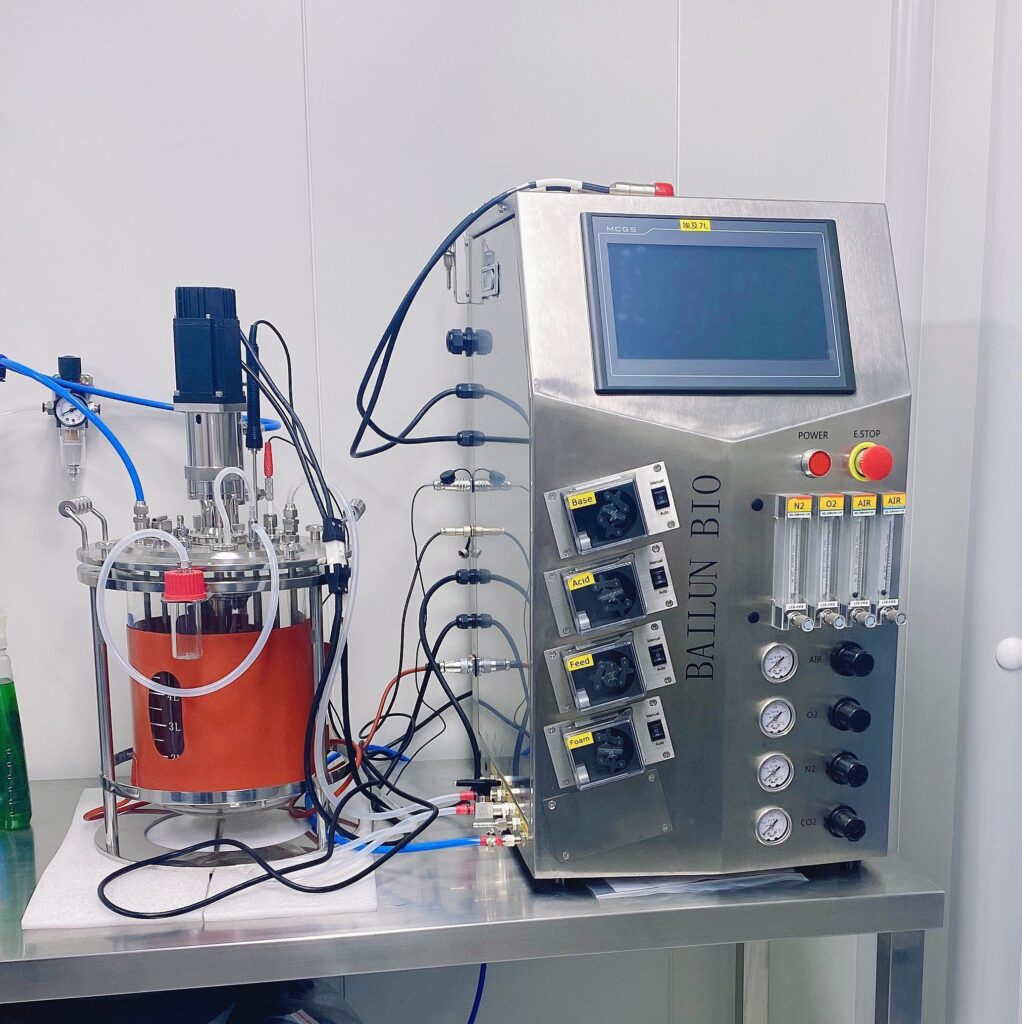
Although there are some limitations of the benchtop bioreactor, it is still a very useful tool and equipment for laboratory-scale research and preliminary production scale. For the conversion of small-scale to large-scale biological processes, these limitations can be solved through reasonable engineering design and experimental verification, and the research results and experience of benchtop bioreactors can be applied to large-scale industrial production.
Benchtop bioreactors are widely used in various fields. The following is a detailed introduction to its application:
Biopharmaceutical production: Benchtop bioreactors play an important role in the manufacturing process of biopharmaceuticals. Biopharmaceuticals are a method of producing drugs or therapeutic agents using organisms in bioreactors. Common biopharmaceuticals include protein drugs, antibody drugs, and gene therapy drugs. Benchtop bioreactors provide an environment to control and optimize the bioreaction process, ensuring high output and quality of drugs.
Biofuel production: Benchtop bioreactors are used in the production of biofuels, including biogas (such as biogas, hydrogen), bioethanol, biodiesel, etc. The production of biofuels utilizes the ability of microorganisms to ferment and metabolize to convert organic waste or plant-based materials into renewable energy.
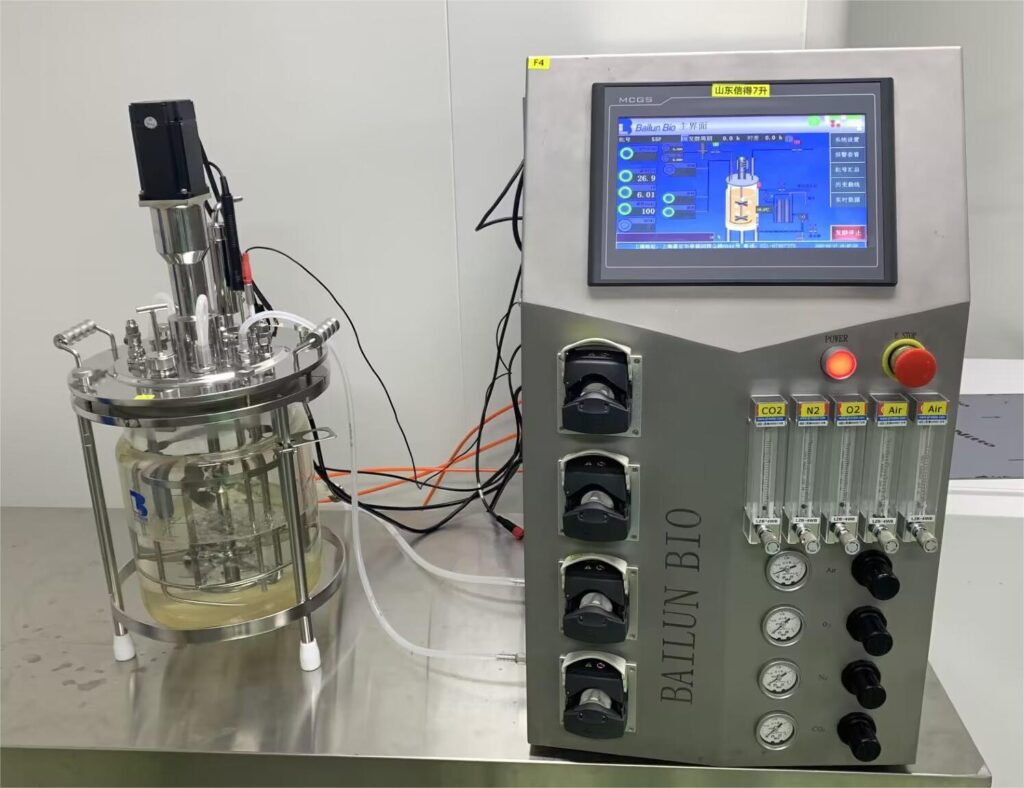
Environmental remediation and waste treatment: Benchtop bioreactors play a key role in environmental remediation and waste treatment. For example, benchtop bioreactors can be used for water treatment to convert harmful substances such as heavy metals and organic compounds into harmless substances. In addition, benchtop bioreactors can also be used for soil remediation, where harmful substances are decomposed and soil quality is improved through the action of bacteria or fungi.
Biomaterial and biochemical production: Benchtop bioreactors are used for the production of biomaterials and biochemicals. For example, microorganisms in benchtop bioreactors are used to synthesize polymers such as bioplastics and biodegradable materials. In addition, benchtop bioreactors are also used to produce food additives, enzymes, amino acids and other biochemicals.
The application of benchtop bioreactors in various fields is still expanding and innovating. With the advancement of technology and the requirements for sustainable development and environmental protection, the application prospects of benchtop bioreactors will be broader and more promising.
